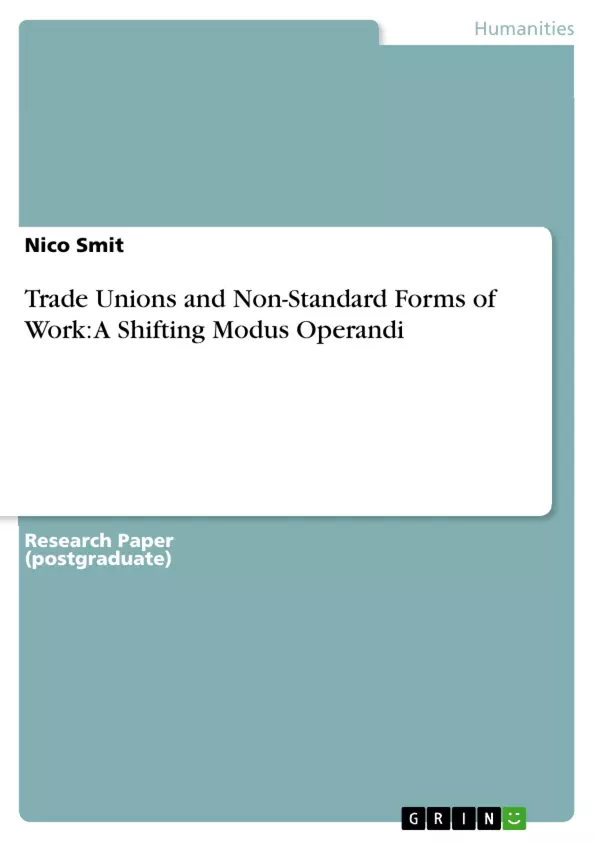Drawing on information gathered by means of one-on-one interviews, and supplemented and
supported by a vast depth of literature in the respective field, this study aims to identify and
discuss the effects of non-standard work on the modus operandi of trade unions in South Africa.
The study makes use of a relative small sample of seven experts in the field of industrial
relations/industrial sociology, and research interviews were conducted based on an interview
schedule, but not limited to it. Although the South African trade union movement operates in
much the same if not entirely same manner as it did pre-1994, a number of factors have been
identified and discussed which have impacted on and affected the labour movement at both
organisational and grassroots level.
Inhaltsverzeichnis (Table of Contents)
- ABSTRACT
- INTRODUCTION
- METHOD
- RESULTS AND DISCUSSION
- WHAT EFFECTS HAVE NON-STANDARD FORMS OF WORK HAD ON THE MODUS OPERANDI OF TRADE UNIONS?
- WHY HAVE UNIONS HAD LIMITED SUCCESS IN ORGANISING NON-STANDARD WORKERS?
- ARE THERE REALISTIC STRATEGIES IN PLACE FOR ORGANISING NON-STANDARD WORKERS?
- ARE THERE ANY BENEFITS FOR NON-STANDARD WORKERS IN JOINING TRADE UNIONS?
- CONCLUSION
Zielsetzung und Themenschwerpunkte (Objectives and Key Themes)
This study investigates the impact of non-standard forms of work on trade unions in South Africa, drawing on interviews with experts in the field of industrial relations/industrial sociology. The study examines the challenges trade unions face in organizing non-standard workers and explores the potential benefits for such workers in joining trade unions.
- The effects of non-standard work on the modus operandi of trade unions in South Africa.
- The reasons behind the limited success of unions in organizing non-standard workers.
- The feasibility of strategies for organizing non-standard workers.
- The potential benefits of trade union membership for non-standard workers.
- The influence of globalization on the South African labor market and the rise of non-standard forms of work.
Zusammenfassung der Kapitel (Chapter Summaries)
- Abstract: This chapter provides a concise overview of the study's objectives, methodology, and key findings, highlighting the impact of non-standard work on trade unions in South Africa.
- Introduction: This chapter introduces the concept of the "triple transition" in South Africa, encompassing political, economic, and social changes since 1994. It examines the impact of these transitions on labor relations, particularly the rise of non-standard forms of work and its implications for trade unions.
- Method: This chapter outlines the research methodology employed in the study, focusing on the use of one-on-one interviews with experts in the field of industrial relations/industrial sociology.
- Results and Discussion: This chapter presents and analyzes the findings of the study, addressing the effects of non-standard work on trade unions, the challenges of organizing non-standard workers, and the potential benefits of trade union membership for such workers.
Schlüsselwörter (Keywords)
This research examines the impact of non-standard forms of work, such as casualization, externalization, and informalization, on trade unions in South Africa. Key themes include the challenges of organizing non-standard workers, the benefits of trade union membership for such workers, and the role of globalization in shaping labor relations in South Africa. The study draws upon insights from industrial relations and industrial sociology.
Frequently Asked Questions
How does non-standard work affect trade unions in South Africa?
It shifts their modus operandi, as traditional organizing methods are less effective for casualized, externalized, or informal workers.
Why do unions struggle to organize non-standard workers?
Barriers include the precarious nature of the work, lack of a centralized workplace, and legal complexities in labor relations.
What is the "triple transition" mentioned in the study?
It refers to the simultaneous political, economic, and social changes occurring in South Africa since the end of apartheid in 1994.
Are there benefits for non-standard workers in joining a union?
Yes, unions can provide collective bargaining power, legal protection, and a voice in a labor market increasingly shaped by globalization.
What methodology was used in this industrial sociology study?
The research relied on one-on-one interviews with seven experts in the field of industrial relations and a review of relevant literature.
- Arbeit zitieren
- Nico Smit (Autor:in), 2009, Trade Unions and Non-Standard Forms of Work: A Shifting Modus Operandi, München, GRIN Verlag, https://www.hausarbeiten.de/document/159599


